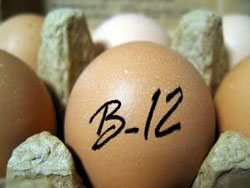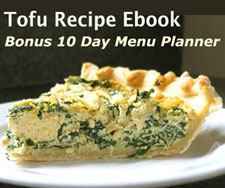
Are You Getting Enough Vitamin B12?
Vit B12 Facts and Benefits for Vegetarian and Vegan Diets
Your doctor, dietition or nutritionist, who ought to know better, may insist that your vegetarian or vegan diet can't meet your nutritional needs, especially for Vitamin B12. Your friends and family will worry about it.
If you don't know the truth, you might even start to think they're right.
The best way to protect yourself is to know the benefits & facts about Vitamin B12, and make sure that you're getting enough B12.
What Is Vitamin B12?
Vitamin B12, or Cobalamin is essential for a healthy central nervous system. It also plays a role in creating new blood cells and DNA. An untreated B12 deficiency can result in severe, permanent neurological damage.
There are two types of cobalamin. Cyanocobalamin is the most widely available, found in supplements and fortified foods. Methylcobalamin is the other form. The body must convert cyano into methylcobalamin, so some say that methylcobalamin is more easily absorbed.
How Much B12 Do You Need?
It shouldn't be difficult for vegetarians, including vegans, to get the Vit B12 RDA (Recommended Daily Allowance) for adults. Besides animal products, many fortified vegan foods and supplements include B12. Separate B12 supplements are inexpensive and effective. If you used to eat meat, you may have enough B12 stored in your body to be recycled and re-used for up to twenty years, but it's safer to assume that isn't true.
It's very important for vegan mothers to make sure that their B12 intake is adequate during pregnancy and breastfeeding. Infants have no B12 stores to draw on and a B12 deficiency can be immediate and devastating.
The RDAs For Vitamin B12
| Adults over 19: | 2.4mcg |
| Pregnant: | 2.6mcg |
| Lactating: | 2.8mcg |
The Canadian Institute of Medicine Dietary Reference Intake Report establishes intake levels for various nutrients. According to this report, RDA's are based on statistical averaging. The authors assume an average 50% absorption rate. The report indicates that B12 absorption is limited to of 1.5 to 2.5 mcg per meal.
In some unusual cases, such as someone eating a huge amount of liver paste, the absorption rate can be much higher. Since that isn't an option for vegetarians, it might be good to spread your B12 intake out over the day.
Absorption from sublingual B12 supplements may be higher as that bypasses the ileal receptors in the stomach, and goes directly into the bloodstream. There hasn't been an upper intake limit established for Vitamin B12, and it's generally recommended to take a high dose supplement several times a week.
Good Sources Of Vitamin B12
Dairy, eggs and fortified foods are all good vegetarian sources of Vitamin B12. Make sure you read the label when buying fortified food, as not all of them have equal amounts.
According to the ADA Position Report on Vegetarian Diets: Miso and tempeh (fermented soy foods), algae, and sea vegetables are not reliable sources of B12. That's because the amount of B12 is generally quite small, varies widely from one brand or even from one batch to another, and is often analog B12 rather than the active type our bodies need.
If you tried to get all of your Vitamin B12 from those sources, you'd need ten times more of these foods than you could possibly eat.
There have been few conclusive studies done on vegetarian sources of B12. But there are plenty of wild theories.
For example, it's been suggested that lifetime vegetarians in India don't have Vit B12 deficiencies, because of all the B12 rich bugs and bacteria in their food, cooking areas, etc. So feel free to eat lots of the iffy sources of B12, even bugs and dirt. Just don't count them :-)
Vegetarian Sources Of Vitamin B12:
| Milk, 8oz: | 0.9mcg |
| Yogurt, 8oz: | 0.9mcg |
| Cheese, 1oz: | 0.2mcg |
| Egg, 1: | 0.5mcg |
| Fortified cereals: | read individual labels |
| Fortified milk substitutes: | should also be fortified with calcium and vitamin D - read individual labels |
| Fortified meat substitutes: | read individual labels |
| Nutritional yeast: | (Red Star Vegetarian Support)4.0 mcg |
Vitamin B12 Absorption:
Even if your diet has enough Vitamin B12, you may still be at risk for B12 deficiency.
Why? According to the National Institute of Health (NIH), often deficiencies result from digestive problems which hinder Vit. B12 absorption. Plus, the body's ability to absorb B12 decreases as we age. Even if you consume enough B12, you may not absorb as much as you need.
The rate of absorption of Vitamin B12 depends on many factors, according to the Canadian Institute of Medicine (IOM) 2002 report on Dietary Reference Intakes.
Absorption of Vit B12 Adversely Affected By These Conditions:
- Lack of Intrinsic Factor, a glycoprotein secreted by the stomach. This condition is present in pernicious anemia.
- Poorly functioning terminal ileum (this refers to receptors in the small intestine).
- Part of the stomach surgically removed.
- Inadequate digestive enzymes and gastric acid.
- Impaired liver and/or pancreatic function: Liver stores B12, and secretes it in bile. The pancreas is part of the end stage of absorption.
- Old age: Absorption of Vitamin B12 tends to decrease as you age. There have been a few studies indicating that B12 is a factor in conditions normally associated with aging, which respond to supplements, although a lot more research needs to be done in this area.
Take a good look at what you're eating and make sure you're getting enough Vitamin B12 in your diet. And then take a look at other factors like your health, your age and how long you've been a vegetarian.
If you're over 50 and/or you've been a vegetarian for fifteen or twenty years (more than long enough to use up your stores), you should get your B12 levels tested. Stressful physical events in your life, such as emotional trauma, major illness/injury,or pregnancy & childbirth, may also quickly deplete your stores of B12.
People who can't absorb Vitamin B12 from food sources, seem to be able to absorb B12 from supplements in crystalline form, because they enter the blood stream directly, without going through the whole digestive process involved in separating B12 from food.
If you are over fifty, most experts recommend taking a supplement, or adding fortified food to your diet. If your inability to absorb B12 is due to a lack of Intrinsic Factor in your digestive system, you'll need intramuscular B12 shots for the rest of your life. But not every day, fortunately.
Vitamin B12 Deficiency:
Some symptoms of Vitamin B12 deficiency: Confusion, anemia, loss of appetite, diarrhea, fatigue, weakness, and poor balance. If you have any symptoms of B12 deficiency, talk to your doctor.
You may have some of these symptoms not just because you're old, or did drugs in the sixties, or you're going through menopause. It's important not to try self-diagnosis, since any of these symptoms can be the result of a different serious condition. It's best to find out for sure.
The fact is, those who insist that you can't possibly be getting enough Vitamin B12 are as likely to be deficient as you are. B12 deficiency is caused as much or more by poor absorption as by low intake.
If you want to know for sure about your B12 status, get a blood test done at a testing lab or doctors's office.
What if you have enough Vitamin B12 in your diet, as well as other key nutrients, and you have good B12 absorption? But your doctor is still giving you grief about being vegetarian. Maybe it's time to vote with your feet, and find a doctor who is more knowledgable about vegetarian diet.








